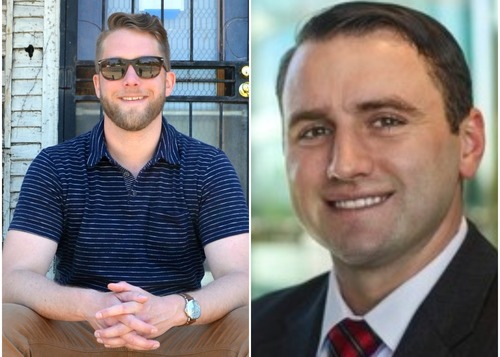Townhouses are being developed by Astral Weeks at 2119 Field Street. (Photo Michael Lucido)
A high profile dispute between a Detroit developer and an activist neighborhood association appears to have been at least partially resolved, with both sides getting something, but not everything, they wanted.
The dispute took place over an abandoned strip of row houses in Detroit's Islandview neighborhood, which became a focal point in the gentrification debate after a developer sought a tax break to convert them into upscale townhouses.
The neighborhood group, the Charlevoix Village Association, protested, saying the proposed rents were not affordable enough and risked raising property values and praising long-time residents.
They scored a win against developer Astral Weeks when they learned the company was the investor of a separate project in the neighborhood that had raised more than $ 38,000 in unpaid disease cards, prompting the city to approve its application to put on tax relief and sign a contract with the company's partner, the landlord-developer Reimer Priester, to reconcile the problematic project.
Nine months later, Astral Weeks was approved for roughly $ 600,000 in subsidies for the Kercheval and Field townhouses, while Priests made progress on the other project – the rehab of 50 homes known as the Detroit Village Initiative Has achieved improvement in conditions.

A home that was renovated as part of the Detroit Village Initiative. (Photo: Astral Weeks)
Although Priest missed the November contract deadline to get certificates of conformity at most rental homes, the city says it won't take any action against him as he is in the final stage of getting the property up to date to be brought.
Priest paid the majority of the fines, with nearly $ 20,000 outstanding if he met certain requirements. However, since signing the agreement in late February, he has raised additional outstanding tickets worth $ 2,600.
The lack of impact on priests and the granting of perks to a networked developer fit a broader pattern of city flexibility for businesses willing to invest in Detroit. It's a balancing act often criticized by local residents and neighborhood supporters who find the city too forgiving when it toppled a controversial speculator from a banner suit earlier this year after finding about 10 vacant homes in a portfolio of more than 350 redeveloped had properties.
But leniency can also help the city achieve its ultimate goal of increasing tax revenues. Astral Weeks and Priests, despite the shortcomings of their Detroit Village Initiative, have done a lot of good through this move, bringing higher income people to an area where there was previously no investment and spurring new economic activity.
In statements emailed, a spokesman for Astral Weeks and an urban development official said the company was not responsible for any remaining issues on the Detroit Village Initiative project with Priest because it was only an investor and had no final say in decision-making. The city and priests both say everything is on track to bring houses into line and blame Covid for delays.
Despite the fact that Priest's agreement with the city has already been extended by three months to explain the pandemic, Detroit Buildings, Safety Engineering and Environmental Department project manager Julie Vande Vusse said the city will continue to work with him, " provided he has signed the consent consent. "The agreement warns the city if its terms are not met.
However, some do not see the benefits of this business-as-usual approach and believe that the city should at least have waited to learn the fate of the troubled properties before giving out the subsidy.
"They shouldn't have given anyone any money until they cleared their mess," said Toyia Watts, a longtime resident and president of the Charlevoix Village Association, the group that discovered the disease maps and fought against subsidies for the Kercheval townhouse project and field. "If that's the case, anyone can come in and leave their properties spoiled and ugly … Hell no. I'm really mad."

Reimer Priester and Alex DeCamp. (Photos: LinkedIn)
The Detroit Village Initiative was launched in 2015 as a joint venture between Astral Weeks, Priest and Alex DeCamp after the trio jointly identified "the opportunity to renovate a large number of vacant homes," according to a cached version of the now private website of the project.
The aim was to “positively influence” the neighborhood through “high-quality renovation work” on at least 50 vacant, often destroyed houses that it would eventually rent or sell. Priest bought more than 140 properties in the area at the time, often cheaply at the Wayne County Tax Foreclosure Auction.
However, since many of the lots were vacant and badly located, neighbors and activists accused the group of speculation. Meanwhile, the city has stepped up enforcement of the code as part of an aggressive campaign across the city to get landlords to abide by the rules. This led to a large number of violations of the group's houses and vacant lots. This summer, tenants deposited the rent as part of a six-month strike, with Priests handing out rent to those unable to pay due to job losses caused by the pandemic.

One of dozens of vacant houses owned by priests. (Photo: Michael Lucido)
As part of the city campaign, the group's rentals should be technically compliant by September 3, 2019 – the deadline for those in the rest of the neighborhood. As of December 15, 15 of Priester's 20 squats had not yet received certificates of conformity – meaning they had not been upgraded to a standard where people can legally live in them.
Despite the delays, Priest says he has done significant cleanup in the area since the agreement with the city was signed, clearing up overgrowth, trash and debris, and getting in and securing the vacant lots. Tenants agree and appreciate their activism and that of the Charlevoix Village Association.
"It is without a doubt the work of CVA and our strike that did this," said tenant Geoffrey Leonard.
“Until our strike, no one had come by to do any of these repairs. One reason for our strike is because we learned about this agreement. "
The city didn't wait for Priest to keep his promises before reviving the tax break for his partner Astral Weeks. The revised version of the proposal passed 7-2 on July 28th after city officials touted the compliance agreement with Priest and the addition of slightly more affordable housing to the Kercheval and Field project – two units designed for people with An affordable income of $ 44,000 a year on a unit affordable for people who earn $ 27,000.
Astral Weeks sought Brownfield Tax Increment Financing to receive $ 277,000 in increased property tax from the $ 2.5 million project – a reimbursement of environmental costs. The council had already approved a separate tax break for redeveloping obsolete real estate, valued at an estimated $ 325,000 in 2019.
Although city officials supported the community members' tax break at around 50:50, the city took the unusual step of advocating the proposal in addition to its usual reach. Donald Rencher, director of the housing and revitalization department, said his staff wrote letters of support for the project, which were then signed by residents. This was reprimanded by Councilor James Tate.
"I can't stand writing letters," said Tate. "If there are people who actually have a certain attitude towards something, let them express it. Because if you are preparing a serial letter of support, in fairness you should also create a form to get full representation."

Donald Rencher.
In selling the proposal for a tax break, Rencher also downplayed the developer's connections to the troubled Detroit Village project.
"Astral Weeks, the developer of this project, has no disease tickets," he said. You are "a passive investor in another project that broke down".
However, a company's track record in its entirety should be considered when deciding whether to provide incentives and other public benefits, said Rep. Yousef Rabhi (D-Ann Arbor), who previously worked for the Washtenaw County's Brownfield Redevelopment Authority .
"I think it's all linked," said Rabhi. “Everything in the company's history is important to consider. Since the money is public and a developer is breaking the law on a segment of their portfolio, they could bring up potential problems with the project for consideration, be it lack of liquidity or civic conscience. "
Joshua Valiquette contributed to this report.